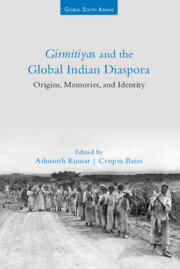3 - Stories of Girmitiyas: Folklore and The Sociocultural World of Indentured Indians in The Sugar Colonies
Published online by Cambridge University Press: 20 April 2024
Summary
The presence of Indian labour across the globe during the nineteenth century not only helped transform the capitalist global economy but also affected the cultural expression, including folklore, of migrant workers. More than 1.3 million Indians signed contracts of indentureship between 1834 and 1916 and shipped out to sugar plantations across the globe under the aegis of European empires. The first colony to bring in Indian indentured work was Mauritius in 1834. British Guyana imported indentured labour next in 1838, Trinidad and Jamaica in 1845, the smaller West Indian colonies of St Kitts, St Lucia, St Vincent and Grenada in the 1850s, Natal in 1860, Suriname in 1873 and Fiji in 1879. Most indentured Indian labourers chose to stay in their new homes after the termination of their contracts and formed a distinct Indian diaspora in their respective host countries. Indentured Indians brought many sociocultural norms and expressions to the host countries which evolved over the succeeding generations. Folklore is one of these traditions.
Folklore is the traditional expression of a society or a particular group of people in which folk tales, songs, ballads, proverbs or jokes are transmitted from one generation to another. In the course of transmission, the folklore changes, depending on the place and cultural context. This is one of the reasons that different versions of the same folk tales exist. The origin and authors of folklore usually remain hidden as the stories and traditions are carried on and spread orally among often illiterate people.
INDENTURED FOLK TALES
When indentured migrants reached plantation colonies, they not only brought Indian religio-cultural norms but also folklore. Most of the folklore of the indentured Indians is in the Bhojpuri language as the majority of migrants were from the Bhojpuri-speaking areas of north India. However, over time, exposure to the languages, places and space of the host countries meant that indentured folklore in Mauritius can be found in both Creole and Bhojpuri. Other folklore in Mauritius is recorded in south Indian languages, such as Tamil, as a significant portion of the indentured there were from south India.
There are broadly five kinds of folk tales prevalent among Indian indentured societies across the globe. These are didactic tales, social stories, religious tales, love stories and entertainment stories. Moralistic tales endeavoured to encourage certain behaviours in children (and adults). A moral education was attempted through such accounts.
- Type
- Chapter
- Information
- Girmitiyas and the Global Indian DiasporaOrigins, Memories, and Identity, pp. 69 - 82Publisher: Cambridge University PressPrint publication year: 2024

